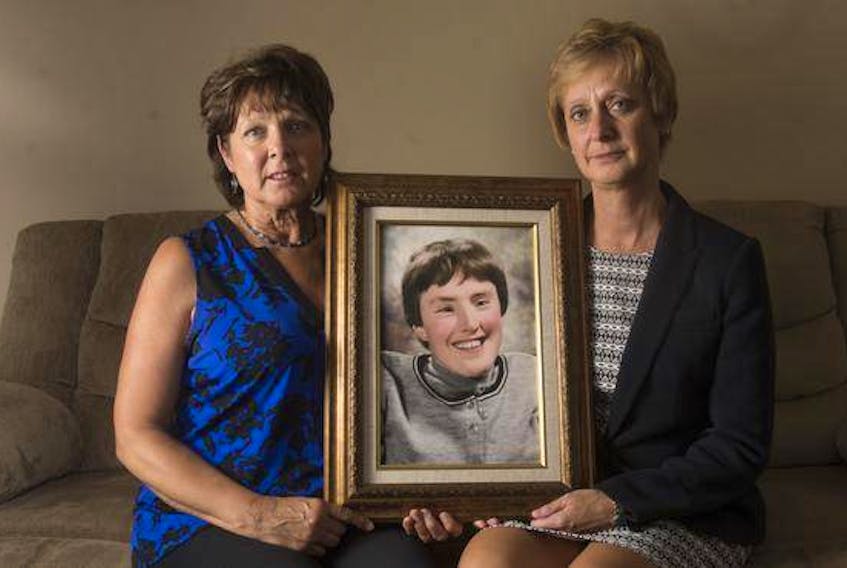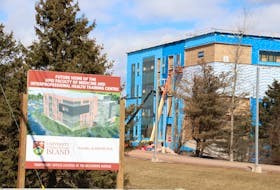Members of Chrissy Dunnington’s family say they have lost faith in the Department of Health and Wellness’ ability to investigate their complaint that her care was negligent while she was a resident of Parkstone Enhanced Care, a facility owned by Shannex Inc.
A complaint was made under the Protection of Persons in Care Act (PPCA) after 40-year-old Chrissy was admitted to the Emergency room of the QEII Health Sciences Centre on Jan. 28, 2018 in septic shock from a bedsore five centimetres across. Chrissy, who was born with spina bifida, never recovered and died in hospital this past March. Her foster family received the preliminary report from the Department of Health investigator (Long-term Care Monitoring division) last week.
“A healthy, 38-year-old disabled woman entered into the care of Parkstone Enhanced Care in November 2016 with an expectation that she would be safe and well cared for,” writes Chrissy’s sister, Elizabeth Deveau, in the family’s 15-page response to the preliminary report from the investigator.
“Fifteen months later, she died as a result of a stage 4 pressure ulcer injury acquired in their care. Given the gravity of the event, to say we as a family are incredibly disappointed in the inaccuracies . . . (in the) 4.5 month long investigation and report by PPCA would be an enormous understatement. This report fails to speak to, or address many key concerns raised and reported by the family who unfortunately have lost trust and confidence in the ability of the Department of Health to appropriately and impartially investigate this (or other situations of its kind).”
One of the chief omissions the family identifiesin the report is that although staff at the home began documenting a bedsore on Chrissy’s
tailbone in October and according to the report it “continued to worsen through November and December with changes to treatment orders during several occasions in January,” it wasn’t until a week before Chrissy’s emergency hospital admission that staff notified the Dunnington family she had a serious pressure injury.
Her elderly parents or siblings visited every two days. In the family’s response to the preliminary report, Deveau questions why there is no mention of any nurse or doctor referring Chrissy to see a wound care specialist as her condition worsened.
The investigator’s report notes that three days before her emergency admission, Chrissy had a fever and respiratory problems for which the attending physician prescribed antibiotics for possible pneumonia. The report later notes those antibiotics were not received before she was rushed to hospital. It also says: “The physician reported that the resident’s medical history pre-disposed the resident and affected the ability to heal.”
Elizabeth Deveau, writing on behalf of the Dunnington family, takes issue with that statement. “It should be noted that the ‘predisposed medical history, preventing healing’ was a direct result of a missed cancer diagnosis while a resident at Parkstone as well as a grossly advanced, infected stage 4 pressure ulcer that was acquired following admission to Parkstone, and a lack of appropriate nutritional intake and supplement required to heal,” says Deveau.
The family says Chrissy lost 26 pounds during her 15-month stay. The investigator’s report notes a request for nutritional supplements took several months to implement.
Under the Protection of Persons in Care Act,the individual who laid the complaint is given an opportunity to respond to the preliminary findings and to suggest additional people or documents the investigator might want to contact before a final report is written.
The Department of Health’s Enforcement manager for Longterm Care, Robert Lafferty, confirms the first step after receiving a complaint is for the investigator to interview all of the relevant caregivers and review the resident’s medical charts. Lafferty says at any time during the investigation — before or after the preliminary report is completed — the investigator may choose to interview the person who filed the complaint, but there is no requirement to do so.
Deveau isn’t waiting for a phone call. She’s responding in writing to what she perceives as “many inaccuracies” in the investigator’s report, including the statement that Chrissy received chemotherapy. Deveau says the tumour on her breast was so large by the time it was reported and diagnosed during her stay at Parkstone that she was not a candidate for chemo.
The Health Department has suspended further investigation of the family’s claim that Parkstone did not provide adequate care and medical attention. That’s because on Friday Halifax Regional Police announced it was undertaking a criminal negligence investigation.
“The department has an active investigation under the Protection for Persons in Care Act,” said spokesperson Tracy Barron. “We will work with police and, in accordance with our guidelines and to avoid interfering in the policeinvestigation, we will put our investigation on hold.”









